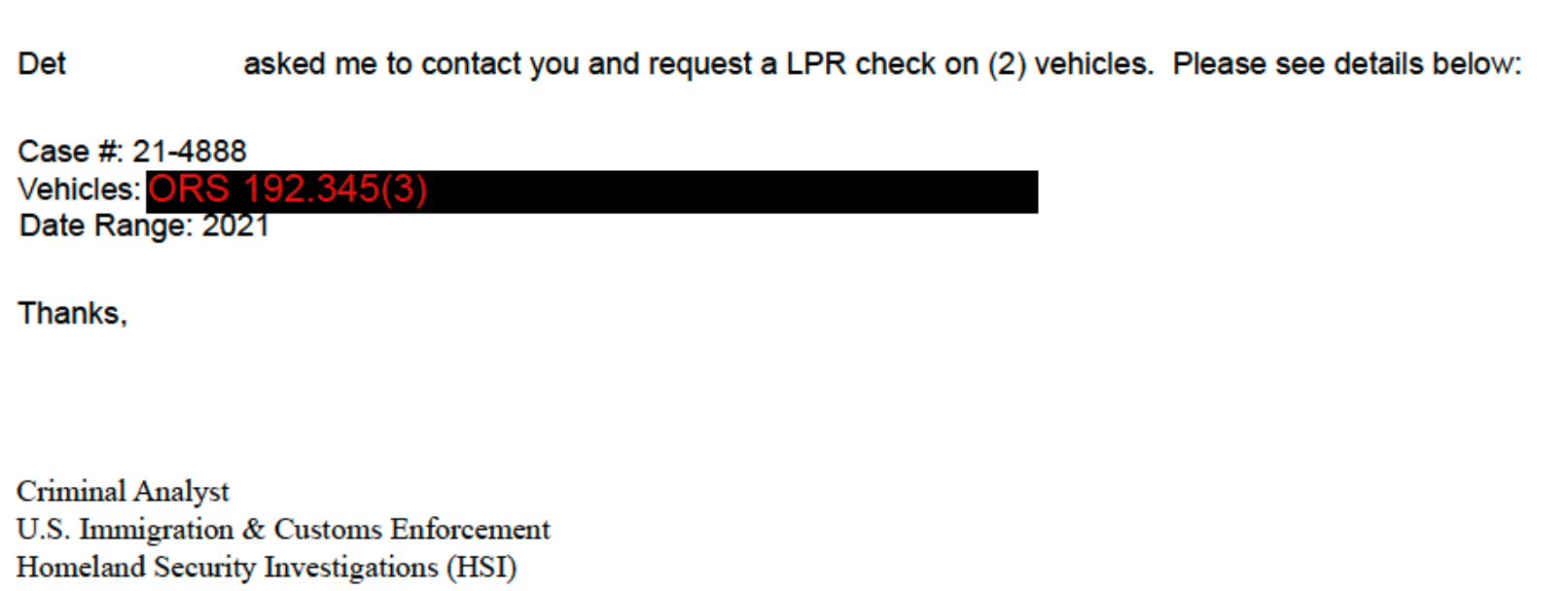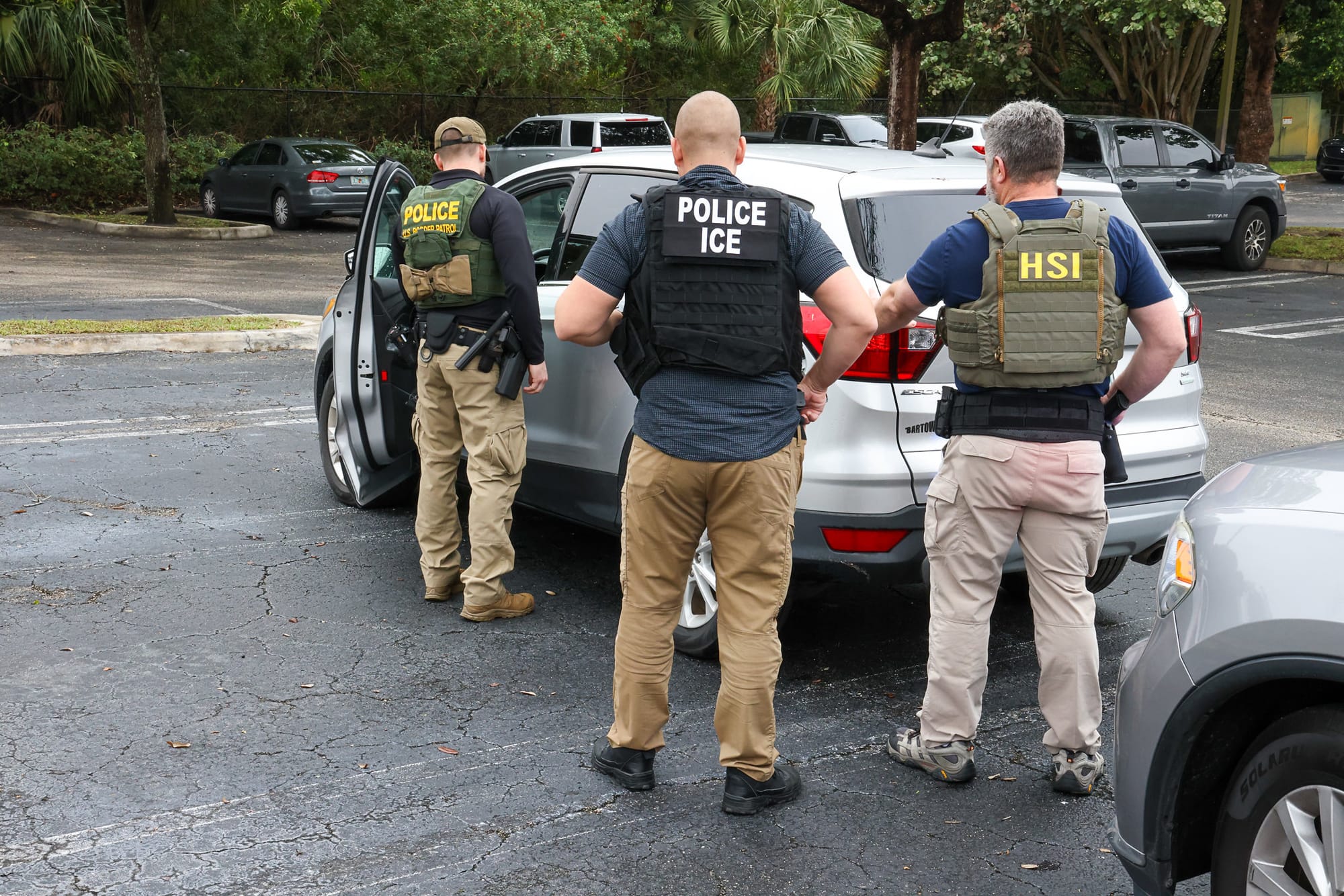Local police in Oregon casually offered various surveillance services to federal law enforcement officials from the FBI and ICE, and to other state and local police departments, as part of an informal email and meetup group of crime analysts, internal emails shared with 404 Media show.
In the email thread, crime analysts from several local police departments and the FBI introduced themselves to each other and made lists of surveillance tools and tactics they have access to and felt comfortable using, and in some cases offered to perform surveillance for their colleagues in other departments. The thread also includes a member of ICE’s Homeland Security Investigations (HSI) and members of Oregon’s State Police. In the thread, called the “Southern Oregon Analyst Group,” some members talked about making fake social media profiles to surveil people, and others discussed being excited to learn and try new surveillance techniques. The emails show both the wide array of surveillance tools that are available to even small police departments in the United States and also shows informal collaboration between local police departments and federal agencies, when ordinarily agencies like ICE are expected to follow their own legal processes for carrying out the surveillance.
In one case, a police analyst for the city of Medford, Oregon, performed Flock automated license plate reader (ALPR) lookups for a member of ICE’s HSI; later, that same police analyst asked the HSI agent to search for specific license plates in DHS’s own border crossing license plate database. The emails show the extremely casual and informal nature of what partnerships between police departments and federal law enforcement can look like, which may help explain the mechanics of how local police around the country are performing Flock automated license plate reader lookups for ICE and HSI even though neither group has a contract to use the technology, which 404 Media reported last month.

Kelly Simon, the legal director for the American Civil Liberties Union of Oregon, told 404 Media “I think it’s a really concerning thread to see, in such a black-and-white way. I have certainly never seen such informal, free-flowing of information that seems to be suggested in these emails.”
In that case, in 2021, a crime analyst with HSI emailed an analyst at the Medford Police Department with the subject line “LPR Check.” The email from the HSI analyst, who is also based in Medford, said they were told to “contact you and request a LPR check on (2) vehicles,” and then listed the license plates of two vehicles. “Here you go,” the Medford Police Department analyst responded with details of the license plate reader lookup. “I only went back to 1/1/19, let me know if you want me to check further back.” In 2024, the Medford police analyst emailed the same HSI agent and told him that she was assisting another police department with a suspected sex crime and asked him to “run plates through the border crossing system,” meaning the federal ALPR system at the Canada-US border. “Yes, I can do that. Let me know what you need and I’ll take a look,” the HSI agent said.
More broadly, the emails, obtained using a public records request by Information for Public Use, an anonymous group of researchers in Oregon who have repeatedly uncovered documents about government surveillance, reveal the existence of the “Southern Oregon Analyst Group.” The emails span between 2021 and 2024 and show local police eagerly offering various surveillance services to each other as part of their own professional development.
In a 2023 email thread where different police analysts introduced themselves, they explained to each other what types of surveillance software they had access to, which ones they use the most often, and at times expressed an eagerness to try new techniques.

“This is my first role in Law Enforcement, and I've been with the Josephine County Sheriff's Office for 6 months, so I'm new to the game,” an email from a former Pinkerton security contractor to officials at 10 different police departments, the FBI, and ICE, reads. “Some tools I use are Flock, TLO, Leads online, WSIN, Carfax for police, VIN Decoding, LEDS, and sock puppet social media accounts. In my role I build pre-raid intelligence packages, find information on suspects and vehicles, and build link charts showing connections within crime syndicates. My role with [Josephine Marijuana Enforcement Team] is very intelligence and research heavy, but I will do the occasional product with stats. I would love to be able to meet everyone at a Southern Oregon analyst meet-up in the near future. If there is anything I can ever provide anyone from Josephine County, please do not hesitate to reach out!” The surveillance tools listed here include automatic license plate reading technology, social media monitoring tools, people search databases, and car ownership history tools.
An investigations specialist with the Ashland Police Department messaged the group, said she was relatively new to performing online investigations, and said she was seeking additional experience. “I love being in a support role but worry patrol doesn't have confidence in me. I feel confident with searching through our local cad portal, RMS, Evidence.com, LeadsOnline, carfax and TLO. Even though we don't have cameras in our city, I love any opportunity to search for something through Flock,” she said. “I have much to learn with sneaking around in social media, and collecting accurate reports from what is inputted by our department.”

A crime analyst with the Medford Police Department introduced themselves to the group by saying “The Medford Police Department utilizes the license plate reader systems, Vigilant and Flock. In the next couple months, we will be starting our transition to the Axon Fleet 3 cameras. These cameras will have LPR as well. If you need any LPR searches done, please reach out to me or one of the other analysts here at MPD. Some other tools/programs that we have here at MPD are: ESRI, Penlink PLX, CellHawk, TLO, LeadsOnline, CyberCheck, Vector Scheduling/CrewSense & Guardian Tracking, Milestone XProtect city cameras, AXON fleet and body cams, Lexipol, HeadSpace, and our RMS is Central Square (in case your agency is looking into purchasing any of these or want more information on them).”
A fourth analyst said “my agency uses Tulip, GeoShield, Flock LPR, LeadsOnline, TLO, Axon fleet and body cams, Lexipol, LEEP, ODMap, DMV2U, RISS/WSIN, Crystal Reports, SSRS Report Builder, Central Square Enterprise RMS, Laserfiche for fillable forms and archiving, and occasionally Hawk Toolbox.” Several of these tools are enterprise software solutions for police departments, which include things like police report management software, report creation software, and stress management and wellbeing software, but many of them are surveillance tools.
At one point in the 2023 thread, an FBI intelligence analyst for the FBI’s Portland office chimes in, introduces himself, and said “I think I've been in contact with most folks on this email at some point in the past […] I look forward to further collaboration with you all.”
The email thread also planned in-person meetups and a “mini-conference” last year that featured a demo from a company called CrimeiX, a police information sharing tool.
A member of Information for Public Use told 404 Media “it’s concerning to me to see them building a network of mass surveillance.”
“Automated license plate recognition software technology is something that in and of itself, communities are really concerned about,” the member of Information for Public Use said. “So I think when we combine this very obvious mass surveillance technology with a network of interagency crime analysts that includes local police who are using sock puppet accounts to spy on anyone and their mother and then that information is being pretty freely shared with federal agents, you know, including Homeland Security Investigations, and we see the FBI in the emails as well. It's pretty disturbing.” They added, as we have reported before, that many of these technologies were deployed under previous administrations but have become even more alarming when combined with the fact that the Trump administration has changed the priorities of ICE and Homeland Security Investigations.
“The whims of the federal administration change, and this technology can be pointed in any direction,” they said. “Local law enforcement might be justifying this under the auspices of we're fighting some form of organized crime, but one of the crimes HSI investigates is work site enforcement investigations, which sound exactly like the kind of raids on workplaces that like the country is so upset about right now.”
Simon, of ACLU Oregon, said that such informal collaboration is not supposed to be happening in Oregon.
“We have, in Oregon, a lot of really strong protections that ensure that our state resources, including at the local level, are not going to support things that Oregonians disagree with or have different values around,” she said. “Oregon has really strong firewalls between local resources, and federal resources or other state resources when it comes to things like reproductive justice or immigrant justice. We have really strong shield laws, we have really strong sanctuary laws, and when I see exchanges like this, I’m very concerned that our firewalls are more like sieves because of this kind of behind-the-scenes, lax approach to protecting the data and privacy of Oregonians.”
Simon said that collaboration between federal and local cops on surveillance should happen “with the oversight of the court. Getting a warrant to request data from a local agency seems appropriate to me, and it ensures there’s probable cause, that the person whose information is being sought is sufficiently suspected of a crime, and that there are limits to the scope, about of information that's being sought and specifics about what information is being sought. That's the whole purpose of a warrant.”
Over the last several weeks, our reporting has led multiple municipalities to reconsider how the license plate reading technology Flock is used, and it has spurred an investigation by the Illinois Secretary of State office into the legality of using Flock cameras in the state for immigration-related searches, because Illinois specifically forbids local police from assisting federal police on immigration matters.
404 Media contacted all of the police departments on the Southern Oregon Analyst Group for comment and to ask them about any guardrails they have for the sharing of surveillance tools across departments or with the federal government. Geoffrey Kirkpatrick, a lieutenant with the Medford Police Department, said the group is “for professional networking and sharing professional expertise with each other as they serve their respective agencies.”
“The Medford Police Department’s stance on resource-sharing with ICE is consistent with both state law and federal law,” Kirkpatrick said. “The emails retrieved for that 2025 public records request showed one single instance of running LPR information for a Department of Homeland Security analyst in November 2021. Retrieving those files from that single 2021 matter to determine whether it was an DHS case unrelated to immigration, whether a criminal warrant existed, etc would take more time than your publication deadline would allow, and the specifics of that one case may not be appropriate for public disclosure regardless.” (404 Media reached out to Medford Police Department a week before this article was published).
A spokesperson for the Central Point Police Department said it “utilizes technology as part of investigations, we follow all federal, state, and local law regarding use of such technology and sharing of any such information. Typically we do not use our tools on behalf of other agencies.”
A spokesperson for Oregon’s Department of Justice said it did not have comment and does not participate in the group. The other police departments in the group did not respond to our request for comment.


